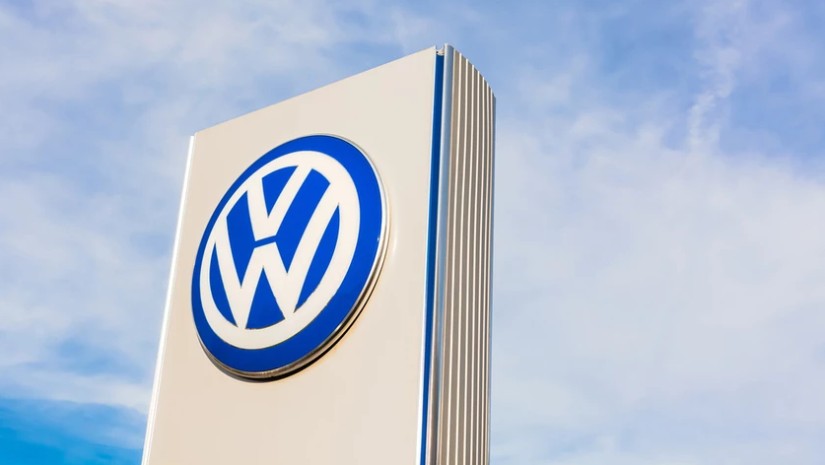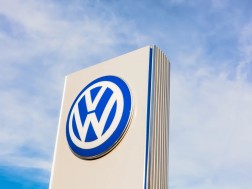When Volkswagen decided to relaunch the Scout SUV brand it took a very unusual step. It created a new subsidiary company to design, build and sell vehicles targeted, almost entirely, at a single market: the United States.
Its status as a subsidiary of Volkswagen Group, similar to Audi and Porsche, gives some indication of just how important this project is to VW. The revived and revamped Scout Motors will introduce its new brand of all-electric off-road-capable SUVs, kind of like Rivian.
But VW is banking on something Rivian doesn’t have, a backstory. An avid fanbase in America fondly remembers Scout. Here, it was one of the pioneering SUV brands, and its original models are collectibles today.
So, just as it’s doing with the Volkswagen ID. Buzz, an electric update of the classic hippie bus, VW is touching on nostalgia to reach a new generation of car buyers. This time, though, it’s an American thing. Germans wouldn’t understand. Or so you might think.
“We really do understand the American spirit but not only that we also actively contribute to it,” Volkswagen Group chief executive Oliver Blume said while discussing the company’s global earnings Wednesday. “What’s rather promising is the revival of the Scout cult brand. This is how we are laying the foundation for an electric SUV and pickup brand in the largest and most profitable US segment.”
Still, Scout could have been introduced as simply a sub-brand, just one or two models, under the popular VW brand. Instead, it’s breaking out entirely on its own.
“It is a unique decision to make but not one that seems too crazy to me, especially for Volkswagen given that it’s in a segment that they are not traditionally strong in or well known for – and given the brand recognition for Scout in the United States from enthusiasts,” said Erin Keating, an industry analyst with Cox Automotive,
But while VW may have bought the name, the new company’s chief executive is already knocking competitors as unoriginal.
“Basically, the entire SUV market is an imitation of Scout, not only what the product is but the name,” said Scott Keogh, chief executive of Scout. “So, Trailblazer, Blazer, Discovery, 4Runner and Explorer, just keep going. They basically took the Scout name and did a synonym search and spit it out.”
The original Scout SUVs and trucks were made by International Harvester in the 1960s and ’70s. They were the commercial truck maker’s foray into the passenger vehicle market. VW came to own the trademark for the defunct brand in 2021 when it purchased Navistar, a successor company to International Harvester. A year later, VW announced Scout’s planned rebirth.
Untapped Potential
The VW Group has a 5% market share for vehicle sales in the US with the mainstream Volkswagen brand accounting for a little less than half of that. The rest comes from Audi, Porsche, Bentley and a tiny bit from Lamborghini. Volkswagen Group executives frequently refer to the North American market as a source of “untapped potential.”
Scout Motors could be a key part of tapping some of that potential, according to Dave Mondragon, a former Ford executive who’s now an industry analyst with S&P Global Mobility. But VW will need to make some difficult steps before it can get there.
“First, attract new customers to your brand who wouldn’t have shopped the brand before. Dealers like that,” he said in a blog post on S&P’s website. “Second, it’s about retaining customers already in your fold, but [who] may migrate out because you don’t have these types of vehicles.”
It’s still not clear exactly how Scout’s vehicles will be sold in the US. Scout Motors hasn’t announced, yet, whether they’ll be sold through VW dealers or through an entirely separate dealer network or even just direct to the customer, the way startups such as Rivian and Tesla do.
Scout CEO Keogh, who used to head Volkswagen North America, insists that Scout, too, is a startup despite being owned by one of the world’s largest automakers. This status, he said, gives Scout the flexibility to do whatever is needed.
“Being a startup in the position we’re in, we challenge ourselves on pivots almost each and every day,” Keogh said. “And we have the ability, right? Because we’re a startup and lean. We don’t have all of these fixed positions.”
Being a separate subsidiary also opens up some options for VW to share the financial burden and the potential risks.
An IPO down the road?
“If we want to pursue a strategic investor, if we want to approach the capital markets, if we want to go to an IPO those strategic doors are open,” Keough said.
Scout is hiring for just about every position you can think of, he said, from human resources to manufacturing and engineering.
Most surprisingly, Scout is investing $2 billion in its own factory. Construction work is underway in Blythewood, South Carolina, where, Keogh said, Scout has access to a good range of suppliers. Volvo, Mercedes and BMW already have long-established factories in South Carolina.
The company also has its own design center in Novi, Michigan, with its own head of design, Chris Benjamin, who previously worked for Mercedes, Volvo and Stellantis, which owns Jeep.
The Scout EVs will mix nostalgic cues without being overly retro, Keogh insists. So far the company has shown only vague silhouette images of the SUV and truck. The company has tested models showing just the general shape to customers and the feedback has been good, he said.
The new Scout will be different than the classic ones, of course. These vehicles will feature modern technology and, most crucially, they’ll be all-electric. That part of the plan has not changed even as EV sales growth has dampened in the US market. Keogh said he isn’t worried.
“I look at people who own and drive electric vehicles and they love them,” Keogh said.
The industry faces challenges with battery costs and charging infrastructure, he allowed, but those things will be worked out. Scout’s parent company, Volkswagen, is building its own EV battery plant in Canada and a battery engineering lab in Chattanooga, Tennessee. And the EV charging company Electrify America is also VW-owned.
The vehicles are expected to go on sale in early 2026, costing around $45,000. That will put the SUV in competition with the Tesla Model Y, the Ford Mach-E, and, most directly, Rivian’s new R2 SUV, another electric off-roader that’s expected to hit the market around the same time.
If there is any company that could do this and make it work, it’s Volkswagen, said Keating, who used to work for VW. The company successfully manages a number of different brands around the world often finely tuned to different markets. VW even relaunched Bugatti from, literally, nothing but a disused trademark.
Source: CNN
















